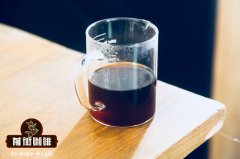Taiwan Gukeng Coffee Taiwan Coffee Brand how to drink Gukeng Hebao Mountain Coffee

Professional coffee knowledge exchange more coffee bean information please follow the coffee workshop (Wechat official account cafe_style)
At the foot of the hundred-year-old Hobao Mountain in Gukeng, there is a Guquan Coffee Manor covering an area of about five armour and planting more than 3000 non-toxic coffee trees. each coffee bean in the manor is harvested artificially, shelled and fermented, and then it can be sent to roasting after picking beans by hand many times, while Guquan insists on growing in a non-toxic way and has passed a number of SGS certification. After years of experience, Gu Quan continues to innovate and retain the original delicacy, carefully baking each grain of coffee and carefully brewing the original Taiwanese flavor, while trying to present handmade Taiwanese coffee. I also hope to bring customers a history of Taiwanese coffee and a cup of Taiwanese boutique coffee with peace of mind.
Many years ago, there was a young coffee farmer in Hebao Mountain. He was a third-generation coffee farmer, Liu Yiteng. At that time, when I saw that my father was too old to continue to run his family's coffee garden, and he grew up watching coffee from an early age, he was deeply afraid that Taiwan coffee would disappear, so he resolutely gave up doing business as far away as the mainland. back to Hubao Mountain in Gukeng, which filled him with childhood memories. After taking over, he established [Guquan Coffee Manor] and worked hard to manage this land left over from generation to generation with the concepts of "insisting on planting on the ground", "the requirement of coffee flavor", and "inheriting coffee history and culture". I hope that this history and characteristics will be seen by more people.
The ancient pit, formerly known as the "nunnery ancient pit", was renamed as the ancient pit in 1920. As early as the period of Japanese occupation, the Japanese began to grow as many as 300 hectares of "Arabica" coffee in Hebao Mountain. Because of their good quality, they were selected as an important cash crop to pay tribute to the Japanese emperor at that time. In the 1950s, the Kuomintang government built the largest coffee factory in Asia in the Douliu area of Yunlin County, becoming the most important coffee processing hub in Taiwan. At that time, a girl in Hebaoshan who had just reached the age of 17, that is, the aunt of Liu Yiteng at the present-day Guquan Coffee Farm, was selected as the "Miss Coffee" and became the spokesperson for coffee in Taiwan.
Qianjie recommended cooking parameters:
Hand punch: V60 filter cup small Fuji R440 grinding 3.5, water temperature about 90 degrees
The recommended grinding degree of normal pressure is 4 and the water temperature is 90 ℃.
The recommended siphon grinding degree is 4, and the water temperature is 90 ℃ ~ 91 ℃.
The pressure grinding degree of Philharmonic is recommended to be 3.5, and the water temperature is 90 ℃.
Important Notice :
前街咖啡 FrontStreet Coffee has moved to new addredd:
FrontStreet Coffee Address: 315,Donghua East Road,GuangZhou
Tel:020 38364473
- Prev

Costa Rican Dota Coffee Cooperative introduces Costa Rican environmentally friendly coffee
Professional coffee knowledge exchange more coffee bean information Please follow Coffee Workshop (Wechat official account cafe_style) the global development of carbon-neutral agricultural products is slow, but it is taking shape. The most successful example is Costa Rica in Central America, where the Duota Coffee Cooperative became the first coffee producer in the world to obtain a carbon-neutral certification. Solis (Fernando Solis
- Next

Taiwan Coffee Taiwan Yagu Coffee Manor introduces the suggestion of coffee hand brewing in Taiwan
Professional coffee knowledge exchange more coffee bean information please pay attention to the coffee workshop (Wechat official account cafe_style) Yaku Coffee Manor, located in Nantou, Taiwan, is committed to the production of boutique coffee, and has won excellent results at home and abroad every year. The country's surname has the famous Da Hengping Mountain with an elevation of 1050 meters, which belongs to the primitive forest facies. The mountain waterfall is tens of meters high after the summer rain.
Related
- Detailed explanation of Jadeite planting Land in Panamanian Jadeite Manor introduction to the grading system of Jadeite competitive bidding, Red bid, Green bid and Rose Summer
- Story of Coffee planting in Brenka region of Costa Rica Stonehenge Manor anaerobic heavy honey treatment of flavor mouth
- What's on the barrel of Blue Mountain Coffee beans?
- Can American coffee also pull flowers? How to use hot American style to pull out a good-looking pattern?
- Can you make a cold extract with coffee beans? What is the right proportion for cold-extracted coffee formula?
- Indonesian PWN Gold Mandrine Coffee Origin Features Flavor How to Chong? Mandolin coffee is American.
- A brief introduction to the flavor characteristics of Brazilian yellow bourbon coffee beans
- What is the effect of different water quality on the flavor of cold-extracted coffee? What kind of water is best for brewing coffee?
- Why do you think of Rose Summer whenever you mention Panamanian coffee?
- Introduction to the characteristics of authentic blue mountain coffee bean producing areas? What is the CIB Coffee Authority in Jamaica?

